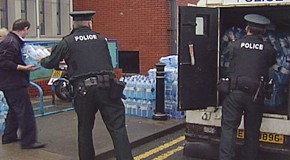La mancanza di investimenti nella rete idrica in Irlanda del Nord è stata incolpata per la grave situazione di mancanza di acqua, che interesserà circa 34.000 case giovedì ed ora è destinata a continuare nella settimana prossima

Trevor Haslett, di NI Water, ha detto che l’età dei tubi dell’acqua della regione sono la causa per cui i disagi sono stati più duri che in altre parti del Regno Unito.
“Anche se abbiamo investito negli ultimi tre anni circa 200 milioni di euro nella nostra rete idrica, si tratta solo dell’1% del sistema idrica”, ha riferito Haslett, Director of Engineering.
“In altre zone del Regno Unito, tra cui la Scozia l’investimento è dell’1,9%, quindi meno della metà dei nostri tubi vengono rinnovati rispetto al resto del Regno Unito. E ciò è accaduti anche negli ultimi 20 anni”.
Alla domanda se ha intenzione di dimettersi per questa vicenda, il presidente di NI Water Laurence MacKenzie, che mercoledì ha rilasciato le sue scuse per la situazione, ha detto che si sta concentrando solo su come riportare l’acqua nelle case.
“Il mio obiettivo al momento è superare questa situazione e questo resta il mio obiettivo”, ha detto MacKenzie. “Credo di star facendo il meglio che posso fare per tenere insieme la squadra”.
Una riunione d’emergenza dell’Esecutivo si terrà a Stormont Castle nel corso della giornata per discutere il problema, dopo che il vice primo ministro Martin McGuinness ha dichiarato che cittadini sono stati “malamente lasciati a terra” da come la situazione è stata gestita, e l’ha definita “una grave crisi interna a NI Water”.
Circa 160.000 litri di acqua imbottigliata, inviati dal governo scozzese per fornire sollievo, vengono distribuiti in tutto il paese.
Il leader dell’Ulster Unionist Party Tom Elliot dice che devono essere trovate risposte a “due semplici domande“.
“Oggi l’Esecutivo si riunisce in risposta alla crisi idrica”, ha affermato Elliot. “Devono rispondere a due domande: perché Northern Ireland Water non è stata all’altezza del compito di fornire un servizio di emergenza, e perché le comunicazioni di Northern Ireland Water con la popolazione sono state un ridocolo pasticcio?”
Le gravi condizioni seguite al grande freddo sono state inizialmente collegate alle rotture delle tubature, ma ora l’attenzione si rivolge alla storia della carenza di investimenti nelle tubature idriche.
NI Water è stata impegnata in un vasto programma di opere capitali, ma l’intero governo di Stormont deve affrontare tagli alla spesa.
Il segretario di Stato per l’Irlanda del Nord, Owen Paterson, ha promesso il sostegno della coalizione governativa, ma la questione della tariffazione dell’acqua per usi domestici, contestata dalla maggioranza dei partiti locali, potrebbe essere riconsiderata.
Il ministro dell’Ambiente Edwin Poots ha parlato di un progetto del valore di 3,6 miliardi di euro di investimento negli ultimi anni, ma il problema è “storico”.
Ma, ha detto, che la responsabilità deve ricadere su Northern Ireland Water e non sul governo.
From BBC News
Tratto da Utv
NI water crisis to last ‘into next week’
A lack of investment in Northern Ireland’s water network has been blamed for the shortage crisis, which will affect around 34,000 homes on Thursday and is now expected to continue into next week.
Trevor Haslett from the company said the region’s aging water pipes are the reason why it has been hit harder that other parts of the UK.
“Although we have invested over the past three years around £150m in our water mains, that is still only replacing 1% of the system,” Mr Haslett, Director of Engineering, said.
“In other areas of the UK including Scotland it’s 1.9%, so just about half of our pipes are being renewed in comparison to the rest of the UK. And they’ve been doing that for the past 20 years.”
When asked if he plans to resign over the affair, Chief Executive Laurence MacKenzie, who issued an apology on Wednesday, said he is only focussing on getting homes back on supply.
“My focus at the minute is getting through this situation and that is what my focus will remain on,” Mr MacKenzie said. “I believe I am doing the best I can do to keep the team together.”
An emergency meeting of the Executive is to be held at Stormont Castle on Thursday to discuss the problem, after Deputy First Minister Martin McGuinness said citizens have been “badly let down” by how it has been handled, and called it a “grave crisis within NI Water”.
160,000 litres of bottled water, sent from the Scottish Government to provide relief, is being distributed across the country.
Ulster Unionist leader Tom Elliot says answers must be found to “two simple questions“.
“Today the Executive meets in response to the Water Crisis,” Mr Elliot said. “They must address two questions: why has Northern Ireland Water not been up to the job of providing an emergency service, and why has Northern Ireland Water’s communications with the public been a ridiculous mess?”
Thawing conditions following the severe cold spell were initially linked to the bursts but now attention is turning to the history of under-investment in the water pipes.
NI Water has been engaged in an extensive programme of capital works but the entire government at Stormont faces spending cuts.
Northern Ireland Secretary Owen Paterson has pledged the coalition’s support but the issue of domestic water charging, opposed by most of the local parties, could be revisited.
Environment minister Edwin Poots said there had been a £3bn investment project in recent years but the problem was a “historic issue”.
But, he said, Northern Ireland Water and not the Government was to blame.
From BBC News